The World is Round: Safe in Chicago
I landed, extended my arms upward, turned 90 degrees and extended again. I'm here at my brother Tim's house just in time for Thanksgiving. It's beyond wonderful to be here. More details coming soon.
PJ Barry's travelblog.
I landed, extended my arms upward, turned 90 degrees and extended again. I'm here at my brother Tim's house just in time for Thanksgiving. It's beyond wonderful to be here. More details coming soon.
(At last, blogger worked out their bugs. Here's the long-promised first batch of Egypt photos)

 In the afternoon, our tour with the ship's guide began. Our first stop was a tour of the ruins of Karnak, now a village just north of the city of of Luxor, but once the religious center of Egypt. The original temple structure was begun during the reign of Ramses III (1184-1153), but various rulers added to the complex over the next 1500 years- in some cases struggling to obscure or minimize the works of their predecessors and former rivals.
In the afternoon, our tour with the ship's guide began. Our first stop was a tour of the ruins of Karnak, now a village just north of the city of of Luxor, but once the religious center of Egypt. The original temple structure was begun during the reign of Ramses III (1184-1153), but various rulers added to the complex over the next 1500 years- in some cases struggling to obscure or minimize the works of their predecessors and former rivals.
 This time with Nathalie, not just for scale:
This time with Nathalie, not just for scale: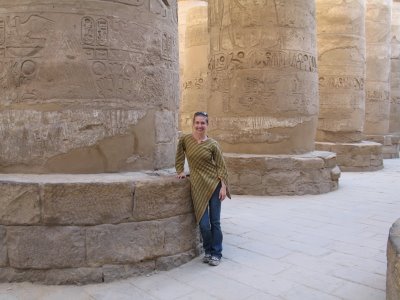

 Then we went back to the boat for dinner (competent if not inspiring) and blessed sleep. We'd been on the go since before 7 and had taken in two museums and two major temple complexes that day. Also, did I mention Egypt was hot? Somewhere in the neighborhood of 85 F and sunny. There were a handful of wispy clouds in Luxor, but they'd be the last we saw until we were back in Europe.
Then we went back to the boat for dinner (competent if not inspiring) and blessed sleep. We'd been on the go since before 7 and had taken in two museums and two major temple complexes that day. Also, did I mention Egypt was hot? Somewhere in the neighborhood of 85 F and sunny. There were a handful of wispy clouds in Luxor, but they'd be the last we saw until we were back in Europe.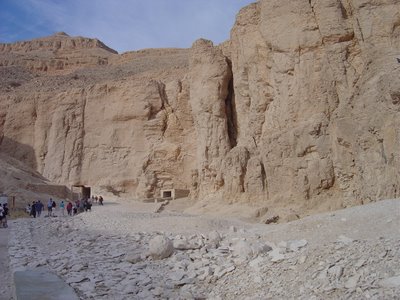 We only had time to tour three of the tombs. Here's where being on the organized tour from the boat began to sting a little bit. Despite the excellent guide and convenience of not having to arrange all the transporation, it's bitter when you've travelled this distance and you only get a short time in a site like this. I can see why many people like to spend an hour here and no more. To be frank, there is a fair amount of similarity in the various tombs. But all the examples we saw were fascinating and beautiful, and unique enough to make me wonder about the next ten or twenty. It's especially frustrating when a half hour that day was wasted on opportunities to spend money. Ah well, travel is a series of compromises, I think.
We only had time to tour three of the tombs. Here's where being on the organized tour from the boat began to sting a little bit. Despite the excellent guide and convenience of not having to arrange all the transporation, it's bitter when you've travelled this distance and you only get a short time in a site like this. I can see why many people like to spend an hour here and no more. To be frank, there is a fair amount of similarity in the various tombs. But all the examples we saw were fascinating and beautiful, and unique enough to make me wonder about the next ten or twenty. It's especially frustrating when a half hour that day was wasted on opportunities to spend money. Ah well, travel is a series of compromises, I think.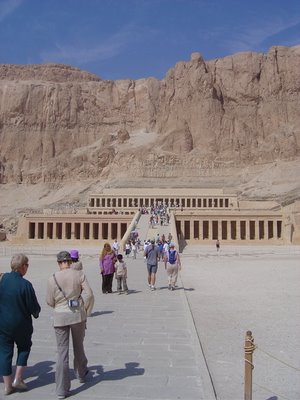 The structure is set amongst a sheer wall of imposing rock, which frames the temple's columns like a frame around a painting. Many of the temple walls here depict her diplomatic and trade missions to neighboring lands.
The structure is set amongst a sheer wall of imposing rock, which frames the temple's columns like a frame around a painting. Many of the temple walls here depict her diplomatic and trade missions to neighboring lands.
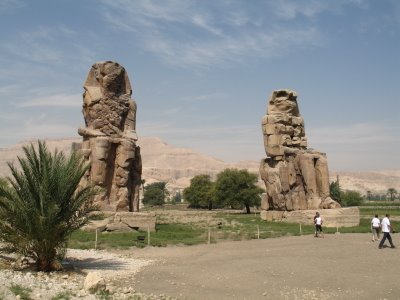
Then back to the ship for a night of cruising down the mighty river. Our next port of call would be Edfu, to see the great temple of Horus. The eighty kilometers to the south wouldn't take long to cover, but the wait at the locks was substantial as a seemingly endless parade of cruise ships waited their turn.
I've made it to London, one of my favorite cties on earth, to see Bene, one of my favorite people! She's living in a big group house just east of the city center that reminds us both warmly of our(dearly departed) commune at 116 College Ave in Somerville. Then, Wednesday, back to Chicago in time for Thanksgiving and the Busiest Travel Day of the Year at O'Hare, just because I can't do things the easy way.
Two notes: First, this post is one of my soapboxes. Those of you only interested in travelogue may defer. Second, Blogger recently changed their software and I'm having a devil of a time uploading photos. Still working on it, but as I'm headed to Chicago in a week in may be at least that long before the Egypt photos make it up.
No photos for this entry, but a story worth hearing, I promise.

Geneva sits on the shores of Lac Lemain, known somewhat erroneously to the outside world as Lake Geneva. Geneva sits at the point where the lake empties into the Rhone river. Not a big city; less than 200,000 people in the city proper, and only a little more than a half million in the surrounding area, but its footprint is larger because of the international institutions that call it home: The World Heath Organization, International Labor Organization, the International Red Cross and the European headquarters of the United Nations, just to name a few. I thought that the cafes of Cambridge sounded like the tower of Babel, but that's nothing compared to Geneva, where more than a third of the population is foreign-born.
 who recently took a job with the WHO working on reproductive health problems in the developing world. I came here straight from Nepal, and it was wonderful to be in the home of a friend instead of hotels and hostels. Nathalie is also the best cook I know, and at last I was not under the tyrrany of the wash-it-peel-it rule. This led to a week of wonderful dining on amazing fresh food. Geneva is Swiss, but culturally and linguistically French, so food of less than exceptional quality is simply not tolerated.
who recently took a job with the WHO working on reproductive health problems in the developing world. I came here straight from Nepal, and it was wonderful to be in the home of a friend instead of hotels and hostels. Nathalie is also the best cook I know, and at last I was not under the tyrrany of the wash-it-peel-it rule. This led to a week of wonderful dining on amazing fresh food. Geneva is Swiss, but culturally and linguistically French, so food of less than exceptional quality is simply not tolerated.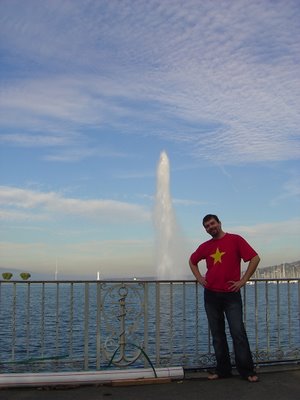 This is the REAL photo of me in front of Jet D'eau, the largest water fountain in the world. More than 140 meters tall, it shoots water at over 200 kph, high into the mountain-ringed Geneva sky, such that there is more than seven tons of water in the air at any given time.
This is the REAL photo of me in front of Jet D'eau, the largest water fountain in the world. More than 140 meters tall, it shoots water at over 200 kph, high into the mountain-ringed Geneva sky, such that there is more than seven tons of water in the air at any given time. One afternoon we toured the grounds of the UN in Geneva, the former home of the doomed League of Nations. The complex is magnificent, but seems almost a bit tragic, as it was built to house the organization that failed to prevent the Second World War.
One afternoon we toured the grounds of the UN in Geneva, the former home of the doomed League of Nations. The complex is magnificent, but seems almost a bit tragic, as it was built to house the organization that failed to prevent the Second World War.



After much frustration with how slowly I've been posting photos of my most recent destinations, my friend Tom Raymo (of Where's Peej fame) decided to take matters into his own hands. His creations are too good to keep to myself. Enjoy.

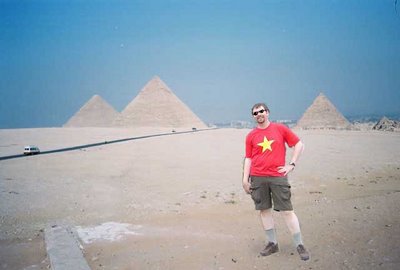


Hey there! I know I´ve been bad about posting lately, but I´ve been in more-or-less constant motion since Nathalie and I left for Egypt. I´m writing you now from Copenhagen, Denmark!